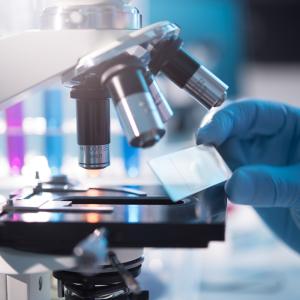
With a familial history of breast cancer, Rachel Wilkins turned to NYU Langone’s Perlmutter Cancer Center for help understanding and mitigating her risk.
Photo: NYU Langone Staff
Rachel Wilkins, a married New Jersey resident and mother of two, lost both her mother and grandmother to breast cancer. At the age of 20, she decided to have genetic testing to determine her risk, and her test results were positive for the BRCA-1 gene mutation, which is associated with breast cancer and ovarian cancer and can increase the risk for women up to 80 percent.
Rachel sought out the oncologists and surgeons at NYU Langone Health’s Perlmutter Cancer Center. In the beginning, she went through the usual regimen of intense monitoring, including mammography and breast MRIs as early detection methods. Catching breast cancer in the early stages can dramatically improve a patient’s outcomes.
Rachel didn’t want to put her life aside, but still understood the need to be proactive. After getting all the information about her risks and options, Rachel decided to work with her surgical oncologist, Freya R. Schnabel, MD, director of breast surgery at Perlmutter Cancer Center and professor in the Department of Surgery, to begin preventive treatments. She was able to start her family, giving birth to her two children before having a hysterectomy, and eventually got a bilateral mastectomy. These procedures dramatically lowered her risk of developing ovarian or breast cancer in the future.
“The information I had access to put me at an advantage, giving me more options,” says Rachel. “I am here at 45 when my mother died at 41, which is why I always tell people to go get checked.”
“As a result of doing these surgeries in a preventive manner, Rachel was never diagnosed with cancer, and never had to undergo treatments like chemotherapy or radiation,” says Dr. Schnabel. “Many women avoid genetic testing because knowing that information can be burdensome. While we are sympathetic to that, I look at it as a way to get some control over your situation.”
See more from ABC7NY.

